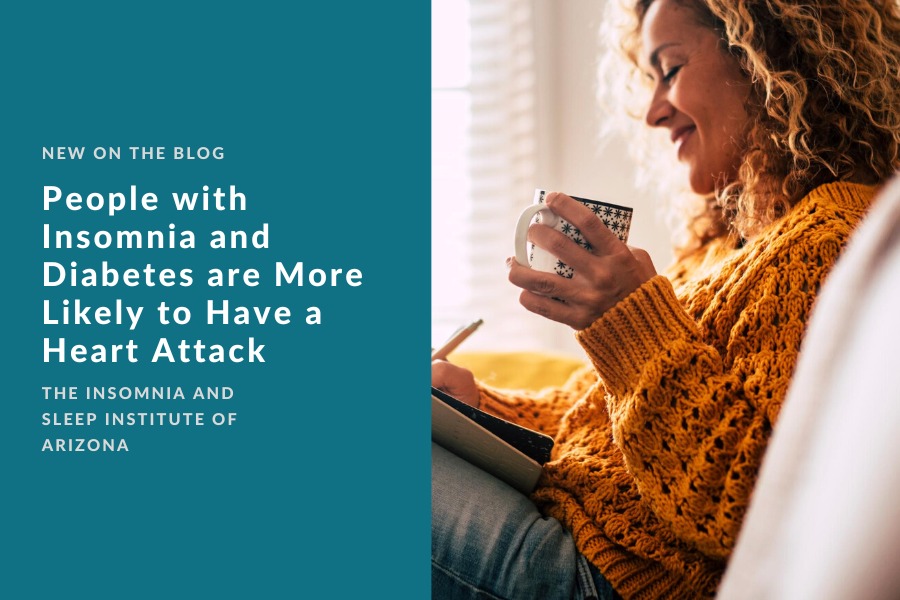Insomnia has been shown to be linked to a number of co-morbidities, with a recent study connecting both insomnia and diabetes to a greater risk of heart attack. At The Insomnia and Sleep Institute of Arizona, we treat a myriad of sleep disorders, including insomnia—one of the most common sleep conditions. Although insomnia most often happens in women, it can occur in men as well and even children. Insomnia can be acute (short term, such as in jet lag) or chronic. Even though just one night of poor, short sleep can negatively affect the next day, chronic insomnia is particularly dangerous. In fact, chronic insomnia is also linked to type-2 diabetes, serving as a catalyst for a variety of health conditions.
According to a recent study published in the February issue of Clinical Cardiology, those with insomnia are 69 percent more likely to have a heart attack. Rates were especially high for those diagnosed with both insomnia and diabetes. The lead author notes that “Insomnia puts the body under stress which triggers cortisol release and can accelerate atherosclerosis.” Cortisol is the stress hormone. Atherosclerosis is the plaque buildup on artery walls that is foundational in heart attacks. These findings were further delineated at the World Congress of Cardiology.
The Connection Between Insomnia and the Heart
The researchers analyzed data from over 1,200 studies, which encompassed 1.2 million adults. About 13 percent of these adults (154,000) had insomnia, but most did not have a heart attack history. However, when the researchers looked at the same data after nine years, 2,400 of those with insomnia and 12,400 without insomnia had experienced a heart attack. People at the greatest risk of a heart attack were those who slept less than five hours per night. Still, researchers stress that getting too much sleep isn’t healthy, either.
Those who slept six hours or less (between five and six hours) actually had a lower risk of heart attack than those who slept nine hours. The author admits, “We were surprised.” Health is all about balance, and that includes sleep health. Those who say they struggled to fall asleep or stay asleep were 13 percent more likely to have a heart attack compared to others who didn’t report these problems. There are other insomnia symptoms that did not seem to affect heart attack risk, like daytime sleepiness and non-restorative sleep (naps).
The Heart of the Matter
Elders with insomnia were twice as likely to have a heart attack compared to younger adults in the data. Plus, younger people, like teens, were also at a higher risk for having a heart attack. These discoveries remained true even after control factors were considered, such as smoking. Overall, these findings support the recent push for sleep to be taken more seriously. However, it can be difficult in a culture where lack of sleep is often a competition and worn as a badge of honor.
One consultant cardiologist involved in the study is encouraging sleep to be a priority. “Waking up and going back to sleep is bad quality sleep,” she says. Insomnia is not simply a struggle to fall asleep at the onset of bedtime, but to remain asleep. The good news is there are many ways you can help your insomnia, including cognitive behaviors therapy for insomnia (CBT-1). This treatment is available in our office and includes changing sleep hygiene habits. “Take time to wind down and prepare for sleep,” urges the consultant.
Protecting Your Health and Heart
This is just one of many recent studies that correlate sleep health to heart health. Insomnia is also associated with other heart conditions such as high blood pressure and blood vessel diseases. A cardiologist who commented on the study says,
Until we better understand and address the specific mechanisms linking insomnia to cardiovascular risk, people who suffer from insomnia and short sleep may benefit from more intense management of cardiovascular risk factors, such as having their blood pressure, cholesterol levels and blood glucose monitored and treated as needed.
If you have trouble falling or staying asleep, help is available. Contact The Insomnia and Sleep Institute today by calling the clinic during business hours or, for the quickest response, complete the online contact form now.





